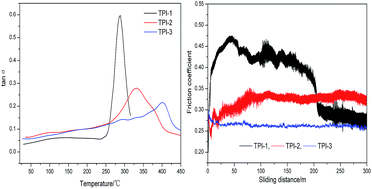Abstract: A series of thermosetting polyimide oligomers with different diamines (isomers) and same calculated number-average molecular weights (M-n) were synthesized with BPDA (biphenyl-tetracarboxylic acid dianhydride), 4,4'-ODA (4,4'-oxydianiline), 3,4'-ODA (3,40-oxydianiline) and 4-PEPA (4-phenylethynylphthalic anhydride). Herein, we investigate the effect of monomer configuration on the mechanical, thermal and tribological properties of thermosetting polyimides. Experimental results demonstrate the relationship between molecular configuration and mechanical, thermal and tribological properties. It is revealed that as the content of 4,4'-ODA increases, T-g, Young's modulus and hardness increases and coefficient of friction (COF) and wear rate (WR) decrease under most conditions. Compared with variations of COFs and WRs of TPIs to velocity or load, it is easy to confirm the major influencing factor under different conditions. KeyWords Plus: MOLECULAR-WEIGHT; THERMOPLASTIC POLYIMIDES; DIFFERENT TEMPERATURES; THIN-FILMS; FRICTION; WEAR; MEMBRANES; COMPOSITES; PERFORMANCE; ADHESIVE Published in RSC ADVANCES, 5 (123):101533-101543; 10.1039/c5ra20166g 2015
|
